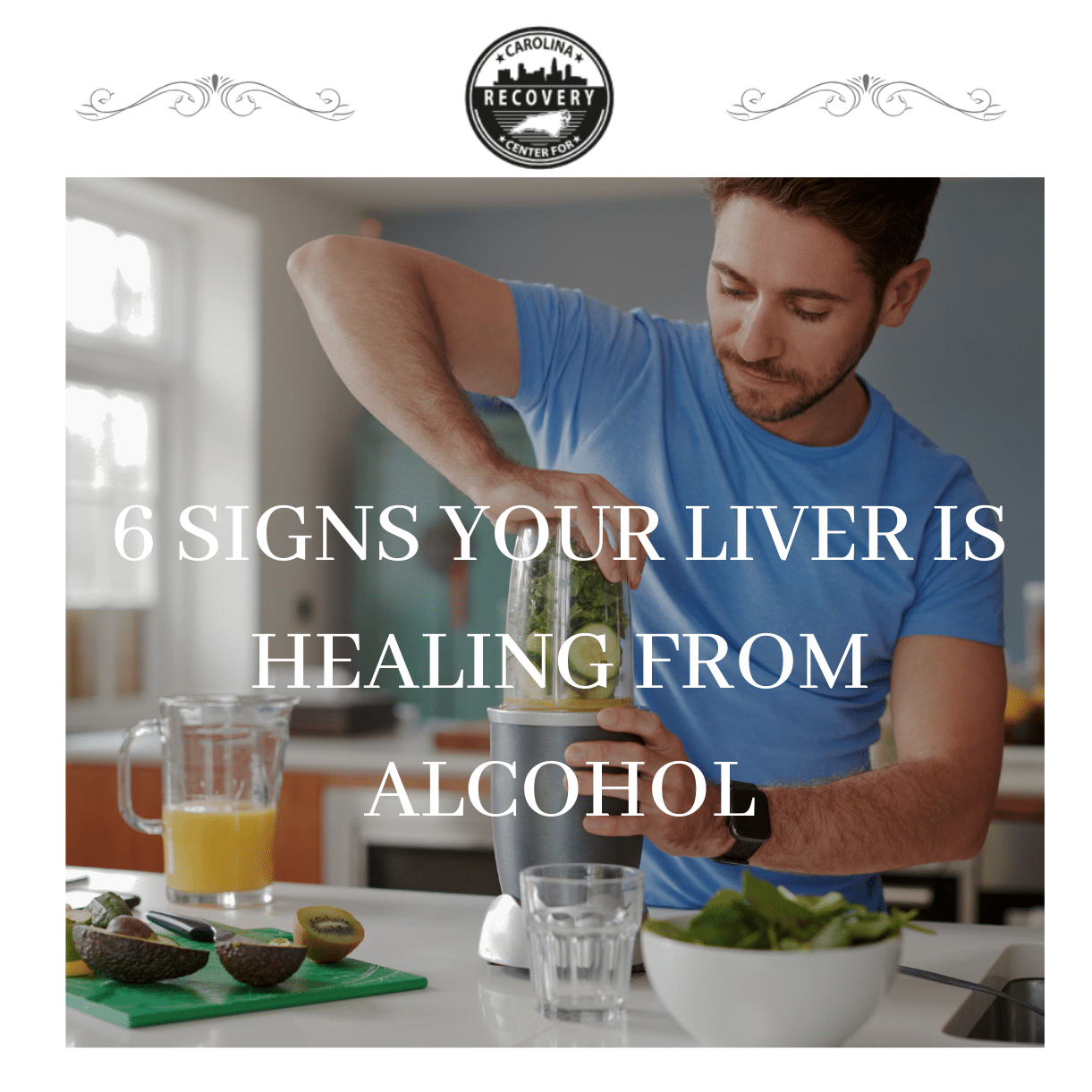6 Signs Your Liver is Healing From Alcohol

Medically Verified: 2/1/24
Medical Reviewer
Chief Editor

All of the information on this page has been reviewed and verified by a certified addiction professional.
Heavy alcohol use can damage your short and long-term health by damaging your liver. This article will explore how alcohol can impact the health of your liver and what steps you can take to allow it to heal.
Reach out to the Carolina Center For Recovery specialists today to find an alcohol rehab program or support during any stage of your recovery.
Why is Liver Health Important?
Your liver is one of the most important organs in your body because it eliminates wastes, helps digest the food you eat, and aids in many other critical processes, including:
- Immunity
- Energy production
- Metabolism
- Breakdown and removal of toxins
When the liver is damaged, it cannot function properly, resulting in a range of health problems. Excessive alcohol use is one of the most significant causes of liver damage in otherwise healthy people, which can be severe. However, after sustaining even long-term and severe injury, the liver can heal itself.
How Alcohol Abuse May Affect Your Liver
When you drink alcohol, the majority is filtered through your liver. The remaining alcohol is removed from your body via urine, sweat, and respiration. Alcohol metabolism can damage your liver’s cells and enzymes resulting in fatty liver, alcohol-related liver disease, and cirrhosis.
Drinking alcohol in small amounts or infrequently is not associated with liver damage. However, drinking heavily for long periods can cause severe damage to this critical organ. If you stop drinking, your liver can begin to heal itself. Over time, your liver may regain its full functionality.
How Much Alcohol Is Safe?
The Centers for Disease Control and Prevention (CDC) provides the following guidelines for moderate drinking, which is not associated with known short or long-term health conditions.
The CDC defines moderate drinking as:
- One or fewer alcoholic beverages per day for women
- Two or fewer daily alcoholic drinks for men
A “drink” is defined as:
- 5 ounces of wine
- 12 ounces of beer
- 1.5 ounces of distilled spirits
- 8 ounces of malt liquor
It’s important to pay attention to the amount of alcohol contained in “drink” served at a bar, restaurant, or other settings. For example, some wine glasses hold 12 ounces or more, which is more than twice the amount the CDC defines as a “drink.” Similarly, a pint of beer–a common serving size in many bars and restaurants–is 16 ounces, meaning each pint counts as 1 ⅓ “drinks” as defined by the CDC.
Regularly exceeding the daily recommended alcohol intake allowance is linked to many short and long-term consequences, including liver damage.
Symptoms of Possible Liver Damage
Your liver performs many vital roles in your immediate and long-term health. It helps you digest food efficiently, remove toxins, produce energy, and much more. When your liver is damaged, you may notice profound effects on your health, including:
- Malaise (general feeling of being unwell)
- Weight loss
- Fatigue
- Jaundice (yellowing of the skin and eyes)
- Poor appetite
- Swollen ankles
- Bloated belly
- Confusion
- Blood in feces or vomit
Liver damage indicates that you need help addressing your alcohol use. Without help, you may develop severe liver diseases, including alcoholic hepatitis and cirrhosis, which can cause irreversible scarring.
6 Signs Your Liver Is Healing
If you have liver damage from drinking, you must limit or stop alcohol consumption immediately. After a period of abstinence, your liver will begin to heal itself by regenerating healthy cells. This process can take time, but you will start to see signs your liver is healing.
Here are some of the changes you may notice.
1. Better appetite
Since your liver is involved in digestion, liver damage can decrease your appetite. As your liver regenerates, you may notice an increased appetite.
2. Bright skin and eyes
Liver damage leads to jaundice, a yellowing of the skin and eyes that results from toxins building up in the body. When your liver begins to heal, you may notice that your skin and eye color return to normal.
3. More energy
When your liver is damaged, it can’t process nutrients or maintain a healthy metabolism. One of the signs your liver is healing will likely be a noticeable increase in energy. You’ll probably feel less sluggish and tired throughout the day and have improved stamina during activities.
4. Less pain
Excessive alcohol use can cause liver inflammation and throughout the body, resulting in aches and pains. When your liver starts to heal, you may notice less pain associated with this inflammation.
5. More alertness
Decreased liver function can cause an accumulation of toxins. One of the most troublesome symptoms of excessive toxins is brain fog, which can make thinking and memory more challenging. You may notice improved mental clarity, memory, and focus as your liver recovers.
6. Improved immunity
Your liver is a disease-fighter that breaks down viruses and bacteria that can cause illnesses. As your liver begins to heal, it can resume its crucial role in your immune system, making you less susceptible to infections.
Find Help for Alcohol Abuse Now
Your liver is one of your best defenses against harmful substances; an unhealthy one just can’t do its job well. Take care of your liver. If you have signs of liver damage, seek treatment immediately, And if you need help to control your drinking, reach out for the treatment you need by calling the Carolina Center For Recovery now.
References:

